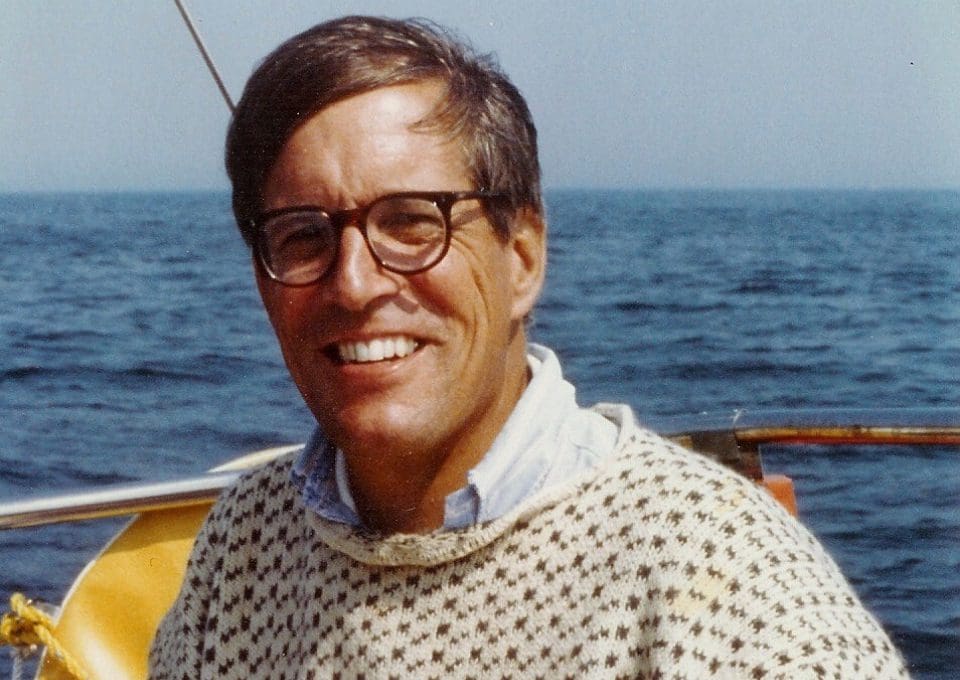He was a tonic in human form – a stimulant for all who had the pleasure of his company.
That’s how Pulitzer Prize-winning Washington Post columnist George Will described the late Pierre “Pete” du Pont Friday.
Hundreds gathered at the Playhouse on Rodney Square in the Hotel duPont for a celebration of life service nearly a year after the former governor’s passing.
In addition to Will, a panel of speakers included Gov. John Carney, du Pont’s wife Elise, and their four children, Elise, Pierre, Ben and Thère.
du Pont’s children remembered him as a man of integrity, patience and wit, on one hand, larger than life and on the other, deeply personal and involved in their upbringing.
Carney credited du Pont with turning Delaware around when it needed a strong leader the most.
“When Pete took office, the state was a mess,” Carney said. “There was a huge budget deficit, the state’s credit rating was the lowest in the country, the Farmer’s Bank with all the state’s revenue deposited there was on the brink of insolvency, our personal tax rate was the highest in the country, and we had a reputation of being bad for business.”
That would all change under du Pont’s leadership, Carney said. He pulled Delaware out of economic crisis, instilled fiscal discipline, created the “rainy day fund,” attracted the banking industry and restored confidence in state government.
“Most importantly,” the governor concluded, “he set a new standard for how we treat each other in this state. Some call it the Delaware Way, others call it the Return Day ethic. Whatever you call it, it just means working together to get things done.”
In 1968, du Pont was elected to the General Assembly to represent Christiana Hundred. Two years later, the moderate Republican was elected to Delaware’s lone U.S. House seat.
He served three terms in Congress before returning to state politics to run for governor in 1976, an election he would win. He remained in the governor’s office for two terms from 1977 to 1985, where he earned the dichotomous reputation of both a groundshaker and a peacemaker.
“Pete was a politician with an engineer’s mentality – an interesting combination,” Will remarked. “His Princeton degree was in mechanical engineering, which means that he, unlike a majority of politicians, was intellectually inoculated against the abiding political sin of indifference to facts and practicalities.
“Politicians can promise this and that but a politician with an engineer’s mind is necessarily a realist,” he continued. “He knows that if calculations are not made correctly and respected, bridges buckle and dams collapse. But to say that Pete was a realist is not to say that he was tethered to a grim realism – there was nothing grim about Pete.”
du Pont, alongside then-U.S. Senator Joe Biden, sought the presidency in 1988. His unique “Damn Right” platform featured controversial proposals, including the phasing out of Social Security in favor of private savings plans, replacing welfare with work, making driver’s licenses conditional on passing random drug tests, and phasing out government subsidies for farmers.
He dropped out of the race after placing last in the New Hampshire primary election.
Will said of du Pont as a presidential candidate, he had “the least substance-to-blather ratio of anyone running for president.”
In 1988, Will said, the Republican nominating electorate, “not for the first time and, lord knows, not for the last time, failed to recognize the most talented candidate.”
“In today’s acid rain of political acrimony,” he concluded, “it is well to remember the politics in the United States can be, has been, and actually it always should be, fun.”


Charlie Megginson covers government and politics for Delaware LIVE News. Reach him at (302) 344-8293 or [email protected]. Follow him on Twitter @cmegginson4.
Share this Post


